北师大版(2019) 必修第三册 Unit 7 Art Lesson3 A Musical Genius课件(34张)
文档属性
| 名称 | 北师大版(2019) 必修第三册 Unit 7 Art Lesson3 A Musical Genius课件(34张) |  | |
| 格式 | pptx | ||
| 文件大小 | 3.7MB | ||
| 资源类型 | 教案 | ||
| 版本资源 | 北师大版(2019) | ||
| 科目 | 英语 | ||
| 更新时间 | 2022-04-01 12:45:15 | ||
图片预览

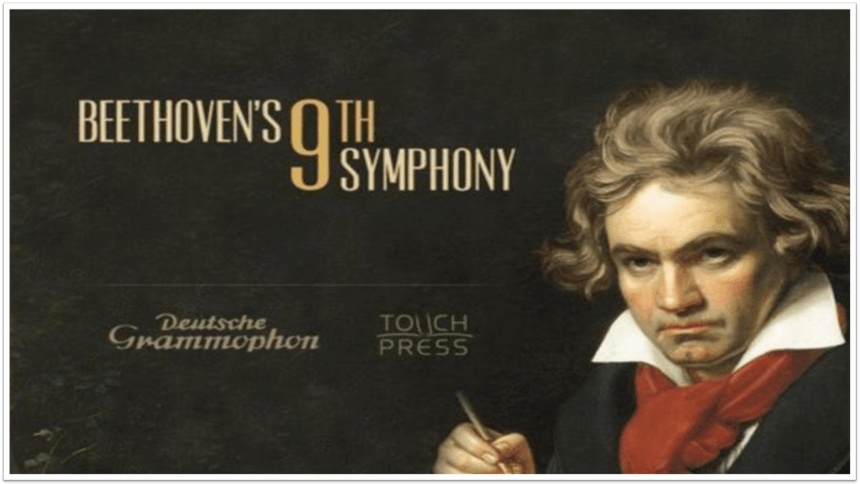
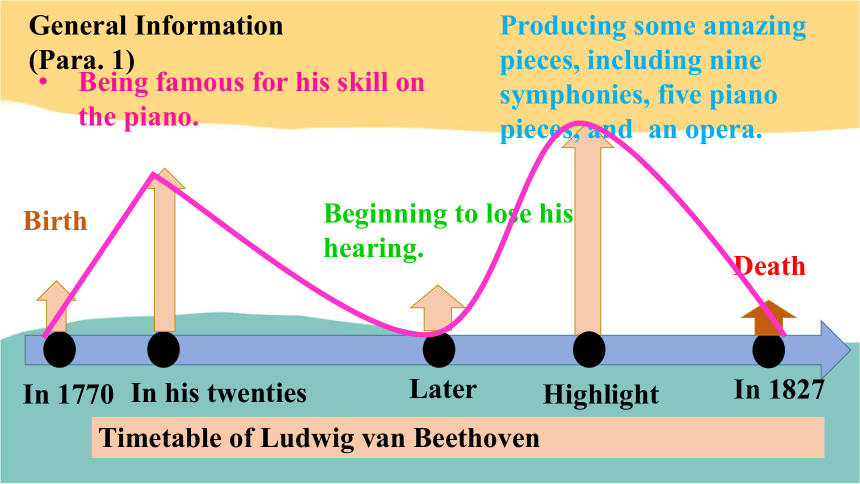
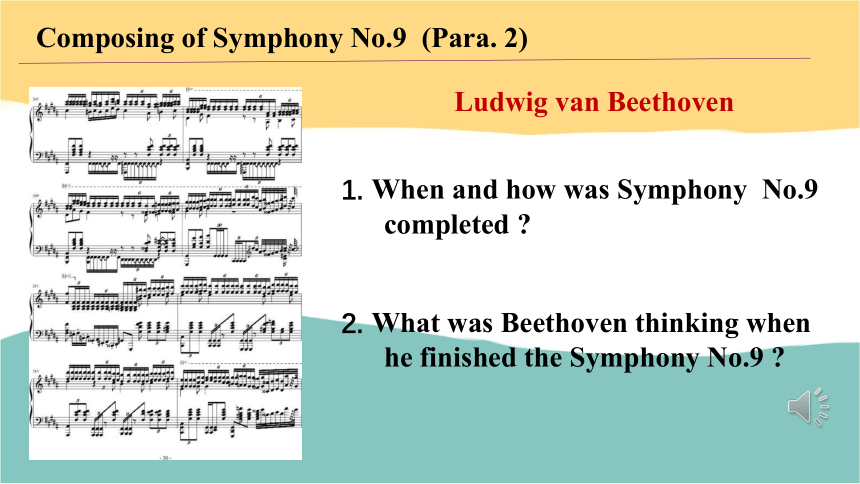

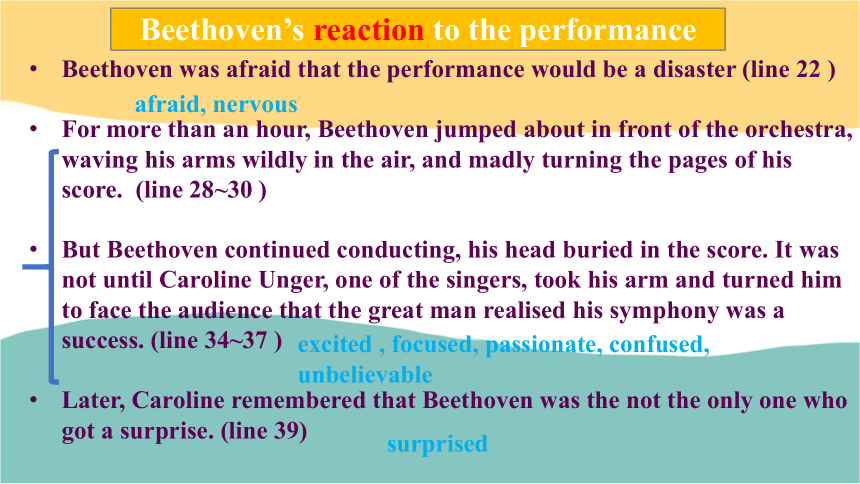
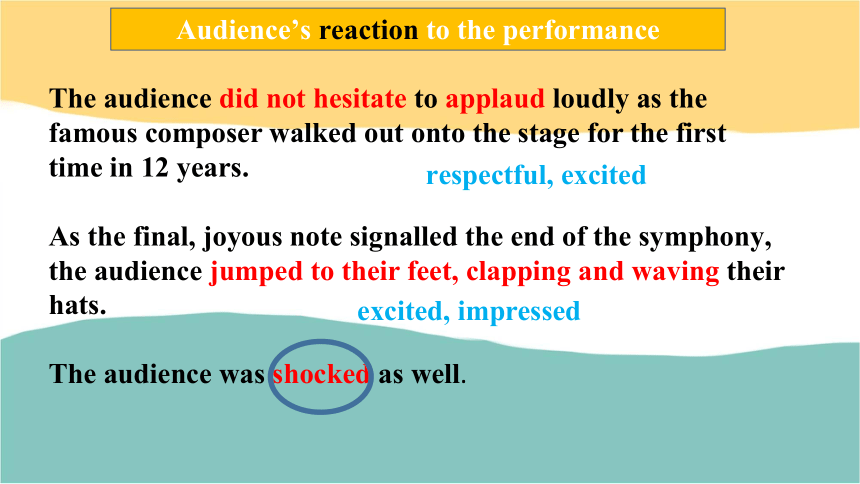
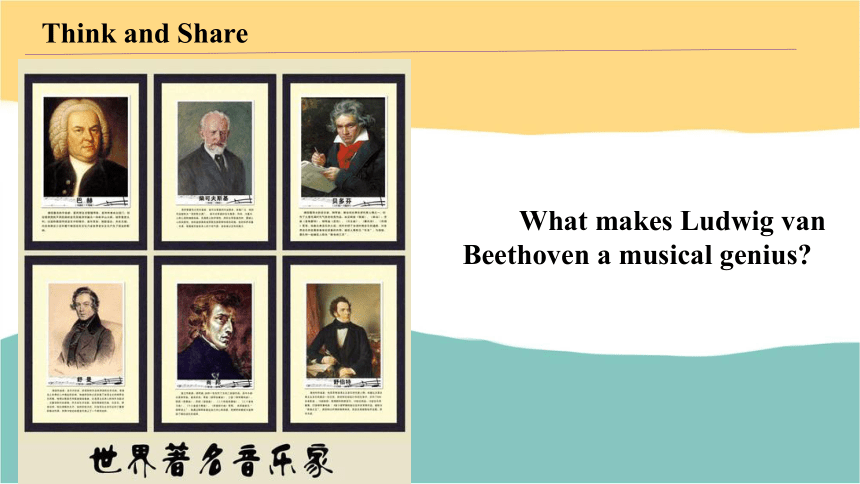


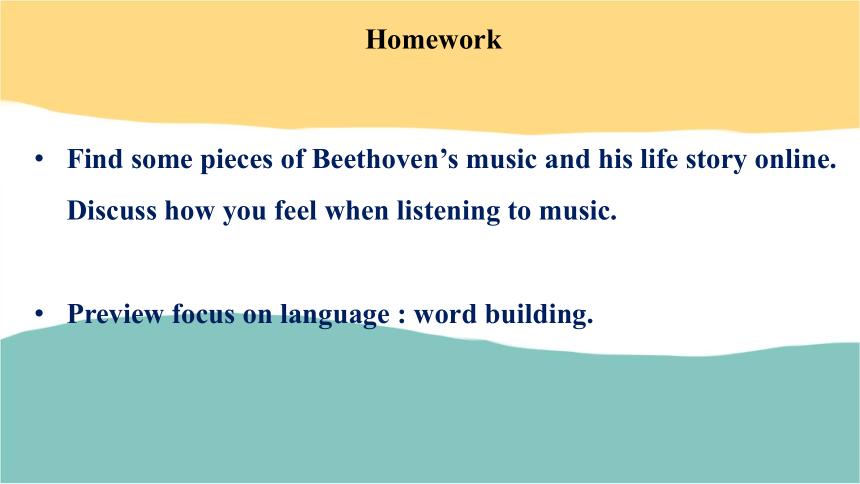

文档简介
(共34张PPT)
Unit 7 Art
Lesson 3 A Musical Genius
genius
A genius is a highly talented, creative, or intelligent person.
In 1770
Birth
Being famous for his skill on the piano.
Later
Beginning to lose his hearing.
Highlight
In 1827
Death
In his twenties
Producing some amazing pieces, including nine symphonies, five piano pieces, and an opera.
Timetable of Ludwig van Beethoven
General Information (Para. 1)
Composing of Symphony No.9 (Para. 2)
Ludwig van Beethoven
1. When and how was Symphony No.9
completed
2. What was Beethoven thinking when
he finished the Symphony No.9
Performance of Symphony No. 9 (Para 3 ~ 6)
Ludwig van Beethoven:
Before
During
After
The audience:
Read sentences related to people’s reactions and use some adjectives to describe them.
Beethoven was afraid that the performance would be a disaster (line 22 )
For more than an hour, Beethoven jumped about in front of the orchestra, waving his arms wildly in the air, and madly turning the pages of his score. (line 28~30 )
But Beethoven continued conducting, his head buried in the score. It was not until Caroline Unger, one of the singers, took his arm and turned him to face the audience that the great man realised his symphony was a success. (line 34~37 )
Later, Caroline remembered that Beethoven was the not the only one who got a surprise. (line 39)
Beethoven’s reaction to the performance
afraid, nervous
excited , focused, passionate, confused, unbelievable
surprised
Audience’s reaction to the performance
The audience did not hesitate to applaud loudly as the famous composer walked out onto the stage for the first time in 12 years.
As the final, joyous note signalled the end of the symphony, the audience jumped to their feet, clapping and waving their hats.
The audience was shocked as well.
respectful, excited
excited, impressed
Think and Share
What makes Ludwig van Beethoven a musical genius
Group Work
Suppose you are a reporter, and you’ve got an opportunity to interview Ludwig van Beethoven, what questions do you want to know from him
Homework
Find some pieces of Beethoven’s music and his life story online. Discuss how you feel when listening to music.
Preview focus on language : word building.
Language Points
1. minor adj. (音乐)小调的,小的,不很重要的
【原句】(P 14)...but few might know how he created Symphony No. 9 in D minor and how its first show went. ……但是很少有人知道他是怎样创作D小调第九交响曲的,以及这部交响曲首演是怎么进行的。
【点拨】
(1) Only a minority of people support these new laws.
只有少数人支持这些新法令。
(2) Boys are very much in the minority at the dance class.
在这个舞蹈班上男孩子占极少数。
(3) Luckily, it was only a minor problem.
幸运的是,那只是个小问题。
【典例】
【练一练】
(1) Only ____________ (少数的) British households do /
does not have a car.
仅仅少数的英国家庭没有汽车。
(2) Women teachers are _____________ (占多数) in
primary schools.
在小学女教师占多数。
a minority of
in the majority
2.composer n. 作曲家
【原句】 (P 14)... Ludwig van Beethoven was a German composer. 路德维希·凡·贝多芬是一位德国作曲家。
【点拨】
compose vt.作曲;创作
composition n. 作文;作曲
(1) Jack is a gifted _________ and the music written by him is
popular with people.
杰克是一位有天赋的作曲家,他写的音乐很受人们欢迎。
(2) Mozart’s ___________ are undoubtedly amongst the
world’s greatest.
莫扎特的作品无疑位居世界上最伟大的作品之列。
(3) He is most widely known for ___________ music for the
film Crouching Tiger, Hidden Dragon and the 2008 Beijing
Olympics.
他因为给电影《卧虎藏龙》和2008年北京奥运会作曲而闻
名。
【练一练】
composer
compositions
composing
3.struggle n. 奋斗 vi. 奋斗,拼搏
【原句】(P 14) Inspired by his struggles with deafness, the composer produced some amazing pieces... 受到与失聪作斗争的启发,这位作曲家创作了一些令人惊叹的作品……
【点拨】
(1)The soldiers have been struggling against the flood day and
night for a week.
战士们已经夜以继日地和洪水抗战一个星期了。
(2)Despite his terrible injuries, the man wouldn’t give up the
struggle for life.
尽管这个男人身负重伤,但他仍然不会放弃求生的努力。
(3)Though he was badly wounded, he struggled to his feet
and went on running.
虽然他伤得很重,但他挣扎着站起来继续往前跑。
(4)It was a struggle for me to make myself heard as the children
talked so loudly at dinner table.
孩子们吃饭时大声说话,我要使自己的话被他们听见真费力。
【典例】
4.respond vi. & vt. 回应,回复
【原句】 (P14) ...Beethoven tried to imagine how people would respond when they heard it for the first time. ……贝多芬努力想象人们第一次听到这首曲子时会作何反应。
【点拨】
(1) How did they respond to the news
他们对这则消息有什么反应?
(2) I waved to her and she responded with a smile.
我向她挥挥手,她对我报以微笑。
(3) He responds that he is too busy to do the task.
他回答说他太忙没空做那个任务。
(4) The government acted in response to economic pressure.
政府为应对经济压力采取了行动。
【典例】
5. hesitate vi. 犹豫,踌躇
【原句】 (P 15)The audience did not hesitate to applaud loudly....观众毫不犹豫地大声鼓掌……
【点拨】
(1)I wouldn’t hesitate to go through fire and water for the
just cause.
我为了正义事业赴汤蹈火,在所不辞。
(2)Without hesitation, she leapt into the water and saved the
drowning child.
她果断地跳入水中,救起溺水的孩子。
(3)I have no hesitation in recommending her for the job.
我毫不犹豫地推荐她做这项工作。
(4) If a student gets hungry on the long drives to and from
school, Wilson never hesitates to buy him a meal.
如果有学生在往返学校的长途车程中饿了,威尔逊会毫
不犹豫地给他买一顿饭。
【典例】
【原句】(P 15) The theatre’s musical director, Michael Umlauf, joined him and together the two men took charge of the orchestra. 剧院音乐指挥迈克尔·乌姆
洛夫也走上台和
他一起指挥乐队。
6. charge n. 主管,负责 vt. 收费,控告,充电
(1) When we shop online, delivery is free of charge in most cases.
当我们网上购物时,多数情况下免费送货。
(2) He took charge of the farm after his father’s death; now the
farm is still in his charge.
他在父亲去世后掌管了农场,现在农场仍在他的掌管之下。
(3) The restaurant charged me 20 for dinner.
这家餐馆收了我20英镑的餐费。
7. signal vt. 标志着,预示 n. 标识,信号
【原句】(P 15) As the final, joyous note signalled the end of the symphony, the audience jumped to their feet, clapping, cheering and waving their hats. 当交响乐在欢乐的音符中结束时,观众们都跳了起来,鼓掌,欢呼,并挥舞着他们的帽子。
【点拨】
(1) The leaders saw the visit as an important signal of support.
领导人将这次访问视作一种表示支持的重要信号。
(2) This was a signal to / for him to continue.
这是一个让他继续下去的信号。
(3) The bell signalled that school was over.
铃声响起,放学了。
(4) If you feel hungry, your body will give a signal.
如果你感到饿了,你的身体就会发出信号。
【典例】
8.broad adj. 宽阔的,广博的
【原句】(P 15) ...she said with a broad smile. ……她满面笑容地说。
【点拨】
(1) Students here study a broad range of subjects.
这里的学生所学的科目范围很广。
(2) Some people prefer to go out for travelling in order to broaden
their horizons.
一些人为了开阔眼界,他们更喜欢外出旅游。
(3) Broadly speaking, I agree with you.
我大体上赞同你的意见。
(4) His job is broadly similar to mine.
他的工作和我的大体相似。
【典例】
9. 【原句】(P 15) ... Beethoven jumped about in front of the orchestra, waving his arms wildly in the air, and madly turning the pages of his score. ……贝多芬在管弦乐队前跳来跳去,他在空中忘情地挥舞着双臂,疯狂地翻动着乐谱。
【点拨】句中waving his arms... and turning the pages为动词 ing形式作伴随状语,句子的主语与其构成逻辑上的主谓关系。
现在分词可以作时间、条件、原因、结果、方式或伴随等状语,它的一般形式表示与谓语动词动作同时发生,它的完成式表示在谓语动词动作之前发生。
(1)He came running into the classroom.
他跑进了教室。
(2)They entered the theatre, talking and laughing.
他们说笑着进入了剧院。
(3)Seeing nobody at home, he decided to leave them a note.
看到家里没人,他决定给他们留个纸条。
(4)Coming out of my house, I saw the volcano erupting.
从我的房子里走出来,我看见了火山喷发。
(5)He sat on the sofa, watching TV.
他坐在沙发上看电视。
【典例】
10.【原句】(P 15)It was not until Caroline Unger, one of the singers, took his arm and turned him to face the audience that the great man realised his symphony was a success. 直到歌手卡洛琳·昂格尔抓住他的手臂,让他面对观众时,这位伟人才意识到他的交响乐获得了成功。
【点拨】
It was... that...是强调句型。
(1)强调句型的基本结构:
It is / was+被强调部分+that / who+句子的其他部分。
(2)强调句的一般疑问句:
Is / Was it+被强调部分+that / who+句子的其他部分?
(3)强调句的特殊疑问句:
Who / What / Which / When / Where / Why / How is / was+it+that+句子的其他部分?
(4)强调“not... until...”结构中的until引出的短语或从句时,结构为“It is / was not until... that+句子的其他部分”。
(1) It is Peter as well as his team that is to replace us to take part in
the city sports meet.
是彼得和他的队员们要代替我们参加市运动会。
(2) Was it the Queen’s room that was decorated with jewels and
famous paintings
女王的房间是以珠宝和名画装饰吗?
(3) It was because he was ill that he didn’t come to our party.
他是因为病了才没来参加我们的派对。
(4) Where was it that the 29th Summer Olympic Games took place
第29届夏季奥运会是在哪里举行的?
(5) It was not until 1920 that regular radio broadcast began.
直到1920年才有了正规的无线电广播。
【典例】
Unit 7 Art
Lesson 3 A Musical Genius
genius
A genius is a highly talented, creative, or intelligent person.
In 1770
Birth
Being famous for his skill on the piano.
Later
Beginning to lose his hearing.
Highlight
In 1827
Death
In his twenties
Producing some amazing pieces, including nine symphonies, five piano pieces, and an opera.
Timetable of Ludwig van Beethoven
General Information (Para. 1)
Composing of Symphony No.9 (Para. 2)
Ludwig van Beethoven
1. When and how was Symphony No.9
completed
2. What was Beethoven thinking when
he finished the Symphony No.9
Performance of Symphony No. 9 (Para 3 ~ 6)
Ludwig van Beethoven:
Before
During
After
The audience:
Read sentences related to people’s reactions and use some adjectives to describe them.
Beethoven was afraid that the performance would be a disaster (line 22 )
For more than an hour, Beethoven jumped about in front of the orchestra, waving his arms wildly in the air, and madly turning the pages of his score. (line 28~30 )
But Beethoven continued conducting, his head buried in the score. It was not until Caroline Unger, one of the singers, took his arm and turned him to face the audience that the great man realised his symphony was a success. (line 34~37 )
Later, Caroline remembered that Beethoven was the not the only one who got a surprise. (line 39)
Beethoven’s reaction to the performance
afraid, nervous
excited , focused, passionate, confused, unbelievable
surprised
Audience’s reaction to the performance
The audience did not hesitate to applaud loudly as the famous composer walked out onto the stage for the first time in 12 years.
As the final, joyous note signalled the end of the symphony, the audience jumped to their feet, clapping and waving their hats.
The audience was shocked as well.
respectful, excited
excited, impressed
Think and Share
What makes Ludwig van Beethoven a musical genius
Group Work
Suppose you are a reporter, and you’ve got an opportunity to interview Ludwig van Beethoven, what questions do you want to know from him
Homework
Find some pieces of Beethoven’s music and his life story online. Discuss how you feel when listening to music.
Preview focus on language : word building.
Language Points
1. minor adj. (音乐)小调的,小的,不很重要的
【原句】(P 14)...but few might know how he created Symphony No. 9 in D minor and how its first show went. ……但是很少有人知道他是怎样创作D小调第九交响曲的,以及这部交响曲首演是怎么进行的。
【点拨】
(1) Only a minority of people support these new laws.
只有少数人支持这些新法令。
(2) Boys are very much in the minority at the dance class.
在这个舞蹈班上男孩子占极少数。
(3) Luckily, it was only a minor problem.
幸运的是,那只是个小问题。
【典例】
【练一练】
(1) Only ____________ (少数的) British households do /
does not have a car.
仅仅少数的英国家庭没有汽车。
(2) Women teachers are _____________ (占多数) in
primary schools.
在小学女教师占多数。
a minority of
in the majority
2.composer n. 作曲家
【原句】 (P 14)... Ludwig van Beethoven was a German composer. 路德维希·凡·贝多芬是一位德国作曲家。
【点拨】
compose vt.作曲;创作
composition n. 作文;作曲
(1) Jack is a gifted _________ and the music written by him is
popular with people.
杰克是一位有天赋的作曲家,他写的音乐很受人们欢迎。
(2) Mozart’s ___________ are undoubtedly amongst the
world’s greatest.
莫扎特的作品无疑位居世界上最伟大的作品之列。
(3) He is most widely known for ___________ music for the
film Crouching Tiger, Hidden Dragon and the 2008 Beijing
Olympics.
他因为给电影《卧虎藏龙》和2008年北京奥运会作曲而闻
名。
【练一练】
composer
compositions
composing
3.struggle n. 奋斗 vi. 奋斗,拼搏
【原句】(P 14) Inspired by his struggles with deafness, the composer produced some amazing pieces... 受到与失聪作斗争的启发,这位作曲家创作了一些令人惊叹的作品……
【点拨】
(1)The soldiers have been struggling against the flood day and
night for a week.
战士们已经夜以继日地和洪水抗战一个星期了。
(2)Despite his terrible injuries, the man wouldn’t give up the
struggle for life.
尽管这个男人身负重伤,但他仍然不会放弃求生的努力。
(3)Though he was badly wounded, he struggled to his feet
and went on running.
虽然他伤得很重,但他挣扎着站起来继续往前跑。
(4)It was a struggle for me to make myself heard as the children
talked so loudly at dinner table.
孩子们吃饭时大声说话,我要使自己的话被他们听见真费力。
【典例】
4.respond vi. & vt. 回应,回复
【原句】 (P14) ...Beethoven tried to imagine how people would respond when they heard it for the first time. ……贝多芬努力想象人们第一次听到这首曲子时会作何反应。
【点拨】
(1) How did they respond to the news
他们对这则消息有什么反应?
(2) I waved to her and she responded with a smile.
我向她挥挥手,她对我报以微笑。
(3) He responds that he is too busy to do the task.
他回答说他太忙没空做那个任务。
(4) The government acted in response to economic pressure.
政府为应对经济压力采取了行动。
【典例】
5. hesitate vi. 犹豫,踌躇
【原句】 (P 15)The audience did not hesitate to applaud loudly....观众毫不犹豫地大声鼓掌……
【点拨】
(1)I wouldn’t hesitate to go through fire and water for the
just cause.
我为了正义事业赴汤蹈火,在所不辞。
(2)Without hesitation, she leapt into the water and saved the
drowning child.
她果断地跳入水中,救起溺水的孩子。
(3)I have no hesitation in recommending her for the job.
我毫不犹豫地推荐她做这项工作。
(4) If a student gets hungry on the long drives to and from
school, Wilson never hesitates to buy him a meal.
如果有学生在往返学校的长途车程中饿了,威尔逊会毫
不犹豫地给他买一顿饭。
【典例】
【原句】(P 15) The theatre’s musical director, Michael Umlauf, joined him and together the two men took charge of the orchestra. 剧院音乐指挥迈克尔·乌姆
洛夫也走上台和
他一起指挥乐队。
6. charge n. 主管,负责 vt. 收费,控告,充电
(1) When we shop online, delivery is free of charge in most cases.
当我们网上购物时,多数情况下免费送货。
(2) He took charge of the farm after his father’s death; now the
farm is still in his charge.
他在父亲去世后掌管了农场,现在农场仍在他的掌管之下。
(3) The restaurant charged me 20 for dinner.
这家餐馆收了我20英镑的餐费。
7. signal vt. 标志着,预示 n. 标识,信号
【原句】(P 15) As the final, joyous note signalled the end of the symphony, the audience jumped to their feet, clapping, cheering and waving their hats. 当交响乐在欢乐的音符中结束时,观众们都跳了起来,鼓掌,欢呼,并挥舞着他们的帽子。
【点拨】
(1) The leaders saw the visit as an important signal of support.
领导人将这次访问视作一种表示支持的重要信号。
(2) This was a signal to / for him to continue.
这是一个让他继续下去的信号。
(3) The bell signalled that school was over.
铃声响起,放学了。
(4) If you feel hungry, your body will give a signal.
如果你感到饿了,你的身体就会发出信号。
【典例】
8.broad adj. 宽阔的,广博的
【原句】(P 15) ...she said with a broad smile. ……她满面笑容地说。
【点拨】
(1) Students here study a broad range of subjects.
这里的学生所学的科目范围很广。
(2) Some people prefer to go out for travelling in order to broaden
their horizons.
一些人为了开阔眼界,他们更喜欢外出旅游。
(3) Broadly speaking, I agree with you.
我大体上赞同你的意见。
(4) His job is broadly similar to mine.
他的工作和我的大体相似。
【典例】
9. 【原句】(P 15) ... Beethoven jumped about in front of the orchestra, waving his arms wildly in the air, and madly turning the pages of his score. ……贝多芬在管弦乐队前跳来跳去,他在空中忘情地挥舞着双臂,疯狂地翻动着乐谱。
【点拨】句中waving his arms... and turning the pages为动词 ing形式作伴随状语,句子的主语与其构成逻辑上的主谓关系。
现在分词可以作时间、条件、原因、结果、方式或伴随等状语,它的一般形式表示与谓语动词动作同时发生,它的完成式表示在谓语动词动作之前发生。
(1)He came running into the classroom.
他跑进了教室。
(2)They entered the theatre, talking and laughing.
他们说笑着进入了剧院。
(3)Seeing nobody at home, he decided to leave them a note.
看到家里没人,他决定给他们留个纸条。
(4)Coming out of my house, I saw the volcano erupting.
从我的房子里走出来,我看见了火山喷发。
(5)He sat on the sofa, watching TV.
他坐在沙发上看电视。
【典例】
10.【原句】(P 15)It was not until Caroline Unger, one of the singers, took his arm and turned him to face the audience that the great man realised his symphony was a success. 直到歌手卡洛琳·昂格尔抓住他的手臂,让他面对观众时,这位伟人才意识到他的交响乐获得了成功。
【点拨】
It was... that...是强调句型。
(1)强调句型的基本结构:
It is / was+被强调部分+that / who+句子的其他部分。
(2)强调句的一般疑问句:
Is / Was it+被强调部分+that / who+句子的其他部分?
(3)强调句的特殊疑问句:
Who / What / Which / When / Where / Why / How is / was+it+that+句子的其他部分?
(4)强调“not... until...”结构中的until引出的短语或从句时,结构为“It is / was not until... that+句子的其他部分”。
(1) It is Peter as well as his team that is to replace us to take part in
the city sports meet.
是彼得和他的队员们要代替我们参加市运动会。
(2) Was it the Queen’s room that was decorated with jewels and
famous paintings
女王的房间是以珠宝和名画装饰吗?
(3) It was because he was ill that he didn’t come to our party.
他是因为病了才没来参加我们的派对。
(4) Where was it that the 29th Summer Olympic Games took place
第29届夏季奥运会是在哪里举行的?
(5) It was not until 1920 that regular radio broadcast began.
直到1920年才有了正规的无线电广播。
【典例】
同课章节目录
- Unit 7 Art
- Lesson 1 Masterpieces
- Lesson 2 Beijing Opera
- Lesson 3 A Musical Genius
- Unit 8 Green living
- Lesson 1 Roots and Shoots
- Lesson 2 Greening the Desert
- Lesson 3 "White Bikes" on the Road
- Unit 9 Learning
- Lesson 1 Active Learning
- Lesson 2 Language Learning Tips
- Lesson 3 The Secrets of Your Memory
